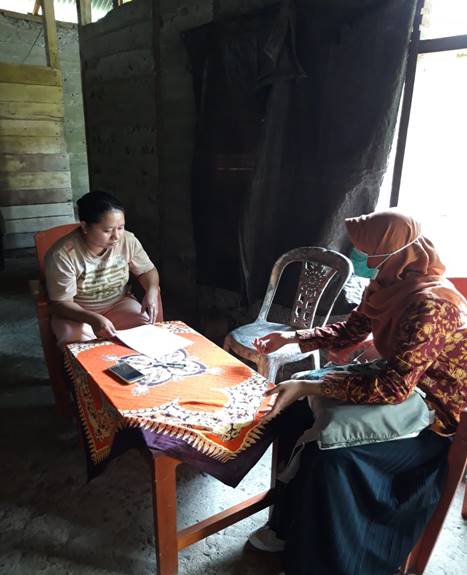According to the National Malaria Control Programme (NMCP) data 2020, 27 districts in Kalimantan and Sulawesi showed slow progress towards malaria elimination for over five years. Of these, nine districts faced malaria issues mainly in mobile and migrant populations such as indigenous tribal communities, illegal lodgers, and illegal miners. To identify specific challenges in each district and provide recommendations to accelerate the attainment of malaria elimination targets in the remaining 18 districts, a bottleneck analysis was conducted by the NMCP in collaboration with the Center of Tropical Medicine, Gadjah Mada University (Center of Tropmed UGM). WHO supported the analysis from August 2020 to March 2021 in 14 districts in Kalimantan and Sulawesi Islands; another four districts were supported by UNICEF. The Center of Tropmed UGM also facilitated and monitored the implementation of given recommendations and provided immediate technical corrections.

Fig. 1 :A village health volunteer at Manalu subdistrict of Sangihe district being interviewed by UGM team to understand the problems of the malaria programme in the field. Photo credit: Center of Tropical Medicine, UGM 2021
The bottleneck analysis was performed in Sangihe, Bitung (North Sulawesi), Poso, Parigi Moutong (Central Sulawesi), Sanggau, Ketapang, Sambas (West Kalimantan), Paser, Penajam Paser Utara, Kutai Barat (East Kalimantan), Tanah Laut, Tanah Bumbu, Tabalong, and Kotabaru (South Kalimantan). The researchers simultaneously conducted qualitative and quantitative elements. Data were collected at province and district levels, two selected primary health care centres, a public hospital, and a private clinic. The team collected data on case finding, diagnosis and case management; vector control; surveillance and monitoring; promotion and advocacy; and malaria programme management. The qualitative approach was conducted through a focus group discussion (FGD) and five in-depth interviews in each district. The team used a purposive sampling method to select the FGD participants and in-depth interviewees. In addition, a series of virtual consultation meetings with WHO, NMCP, and provincial health offices was conducted.
The results revealed that between 2016 and 2020, the malaria trend decreased in each district, with the exception of Penajam Paser Utara district in East Kalimantan. There, the number of cases increased from 1050 in 2019 to 1306 in 2020. The annual blood examination rate trend decreased in all districts by less than 5%. The classification of indigenous and imported cases started in 2018, however some districts have yet to report these data due to a lack of case investigation activities. To summarize, the quality of malaria case investigation at field level requires significant improvement.
A thematic analysis was applied to interpret the qualitative data. Each district has its case-finding strategy based on the mobile migrant population in their areas. The coverage of malaria treatment as per national standard in the Kalimantan region ranged from around 50-80%, especially at the hospital and private clinic levels. Related to vector control thematic areas, vector control activities conducted in all districts were dependent on the distribution of long-lasting insecticide nets (LLIN) in 2017-2019. Regarding surveillance and monitoring, the synchronization of malaria data from hospitals, private clinics, primary health centres (PHCs), and district health offices (DHOs) needs to be improved across all districts. This includes the reporting and recording through the malaria information system (SISMAL), as accuracy and completeness were below 80% in all districts. The cross-programme coordination within DHO and PHC levels could explore more integration of the health promotion and advocacy activities of the malaria programme with other health programmes. High turnover of staff and double assignments for malaria officers with other critical responsibilities, especially at the PHC level, were raised as important challenges.
.jpg?sfvrsn=bd0779e3_2)
Fig. 2: Mass screening for malaria at a primary school in Ampibabo subdistrict, Parigi District. Photo credit: Center for Tropical Medicine UGM, 2021
Recommendations provided by the team were: 1) Disseminate information to all parties involved in malaria case management to ensure comprehensive understanding of standard treatment regimens for malaria; 2) Encourage cross-provincial and cross-sector coordination, especially for cross notification of malaria cases, surveillance, and vector control; 3) Improve human resources skills, especially malaria officers and laboratory team including conducting the competency tests for microscopists and province and district crosscheckers; 4) Ensure capacity building for mapping of malaria receptive areas that have potential for local transmission, epidemiological investigation and response; 5) Ensure the transfer knowledge mechanism is in place to address the potential turnover of staff in charge in malaria program such as on the job training and or provision online training package for new staff; 6) Improve the reporting system of all health facilities that provide malaria treatment services; 7) Encourage the preparation of district regulation and budgeting related to malaria elimination, including the use of village fund to support malaria activities especially for cadres and encourage health promotion support for malaria prevention.
